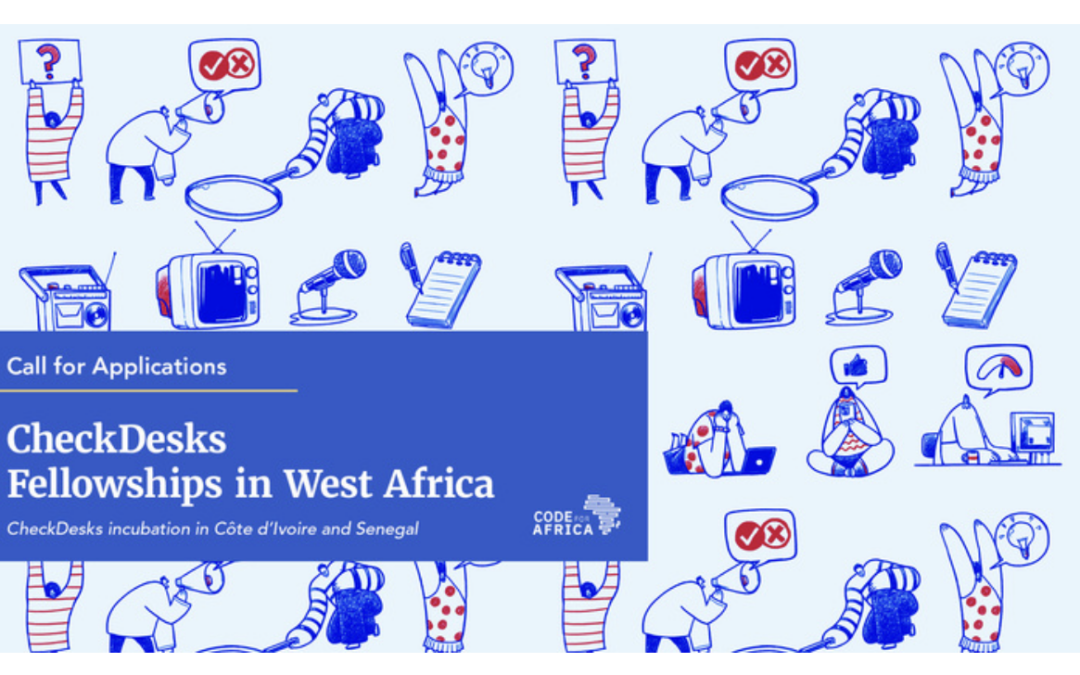Do you want to help debunk conspiracy claims and other toxic misinformation?
Code for Africa (CfA), through its flagship network, the African Fact-Checking Alliance (AFCA), is offering a seven-month incubation programme to established media organisations or watchdog civil society organisations (CSOs) based in Côte d’Ivoire and Senegal to help them set up or expand CheckDesks.
A CheckDesk is a dedicated fact-checking/verification unit within a news organisation or CSO that uses the International Fact-Checking Network (IFCN)-compliant techniques to research and debunk misleading or harmful information.
The fellowships are part of the project ‘Strengthening Resilient Information Ecosystems in Africa,’ an initiative co-financed by the European Union, commissioned by the German Federal Ministry for Economic Cooperation and Development (BMZ) and implemented by the German Development Cooperation (GIZ) in cooperation with diverse partners, including Code for Africa (CfA) and DW Akademie.
The initiative seeks to strengthen the capacity of local media and watchdog organisations to expose, dismantle, and destabilise disinformation networks. It will also promote information integrity through the digitisation of credible sources and supporting influencers to counter online manipulation.
The incubation programme
The programme aims to build a diversified ecosystem of local fact-checking champions to help increase resilience to mis/disinformation within the information ecosystem of Côte d’Ivoire and Senegal.
Successful organisations will receive technical support from CfA, through its in-house fact-checking newsroom at PesaCheck, and disinformation investigation team at the iLAB.
The AFCA incubation programme will also include a seed grant, access to digital resources/tools, advice on cost-efficient editorial production workflows, peer mentoring, and strategic advice on market and audience strategies. The incubation programme will run for seven months.
The organisations will use their skills and platforms of choice to share and amplify the resulting debunks. The fact-checks can take the form of text, visual, or audio media, primarily in local languages, with a particular focus on targeting young people.
Participating organisations will be expected to abide by IFCN principles and to assign full-time staff and resources to operate their new CheckDesks.
The programme will consist of:
- Financial support: The chosen organisations will receive a grant to cover eligible activities and costs.
- Publishing support: The newsrooms will publish the fact-checking products generated under the project on their respective media platforms. The newsrooms will also be supported to publish internationally.
- Organisation building: The selected organisations will receive online consultations with CfA to better understand their audience, refining fact-checks and developing potential revenue models.
- Growing reach: CfA will offer amplification/growth support, including scaling/syndication support.
Still interested? Check if you are eligible:
- The organisation must not work for any paramilitary or security organisation.
- The organisation must be based in one of the following countries: Côte d’ivoire and Senegal.
- The organisation must have an existing online presence, including an actively maintained website and/or social media profiles, or a commitment to establishing a digital footprint at the beginning of the programme.
- The organisation must have internet access to enable participating journalists/trainees/researchers to access project resources and undertake their fact-checking assignments.
- The media organisation or newsroom must be a member of the AFCA network. If not a member at the time of application, fill out this form to become an AFCA member, before applying.
- The organisation must have managerial and editorial staff committed to participating in the programme during the agreed-upon period.
- The organisation must commit to timely and open communication from the management and seconded team members.
- The seconded trainees must commit to agreed-upon weekly online training and task-based class assignments.
- The organisation must commit to broadcasting or publishing content produced through the programme in the specified cadence and driving engagement on an appropriate public platform.
- The seconded trainees must be fluent in the language of tuition and mentorship: French.
If your organisation is eligible, please apply no later than 4 March 2025 by completing this form.
‘Strengthening Resilient Information Ecosystems in Africa’ is a regional program designed to support stakeholders in Côte d’Ivoire and Senegal in shaping an information environment marked by integrity. It takes an interdisciplinary and multi-stakeholder approach, collaborating with state partners, media houses, journalists, social media platforms, regulators and others to increase individual and organizational capacities of recognizing and handling manipulative information flows while increasing reliability of published content.
About the Partners:
Code for Africa (CfA) is the continent’s largest network of digital democracy laboratories, with over 100 full-time data scientists, forensic researchers, technologists and digital storytellers working in support of investigative media and watchdog CSO partners in 26 African countries. CfA builds digital solutions that provide actionable information to citizens to encourage informed decisions while
amplifying voices to strengthen civic engagement for improved public governance and evidence-driven accountability.
CfA will give fellows access to support from its openAFRICA data ‘liberation’ team, the commons.AFRICA open source team, the source.AFRICA evidence research team, and a string of wider communities that CfA manages, including the africanDRONE community of civic drone/mapping pioneers, the sensor.AFRICA community that uses remote sensors to monitor air/water/radiation and other environmental information, the PesaCheck fact-checking team that debunks misinformation, the iLAB forensic investigation team that tracks and exposes hate speech or other toxic content, the CivicSignal media monitoring and content analysis team, and the WanaData network of women data scientists/storytellers who liberate and amplify feminist data.
Deutsche Gesellschaft für Internationale Zusammenarbeit (GIZ) is the German Agency for International Cooperation, responsible for the implementation of development projects primarily funded by the German Federal Ministry for Economic Cooperation and Development (BMZ). GIZ operates in various sectors related to sustainable development, including: Governance and Human Rights, education and employment, environment and climate, health and social development, economic development and digitalisation.
